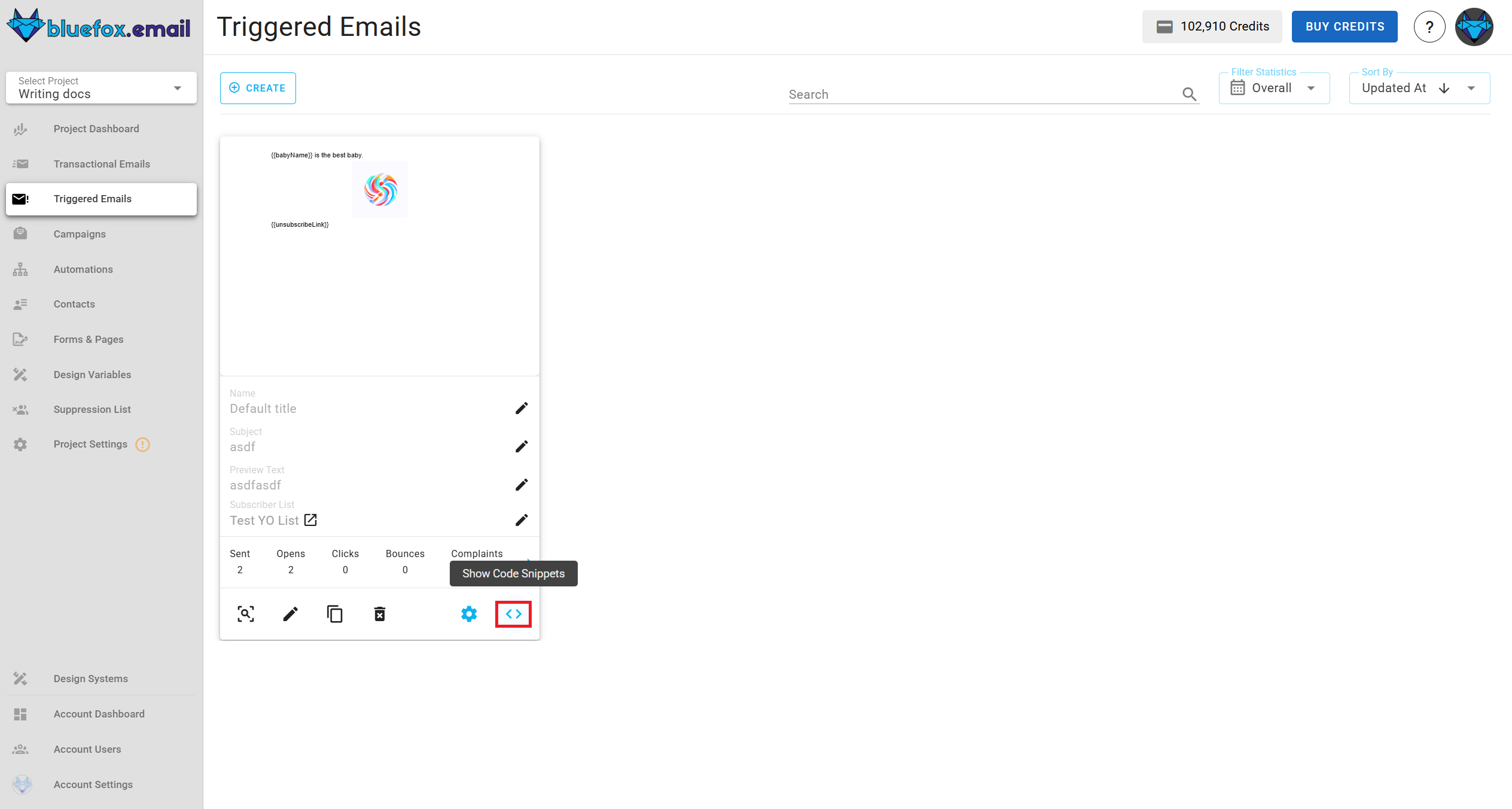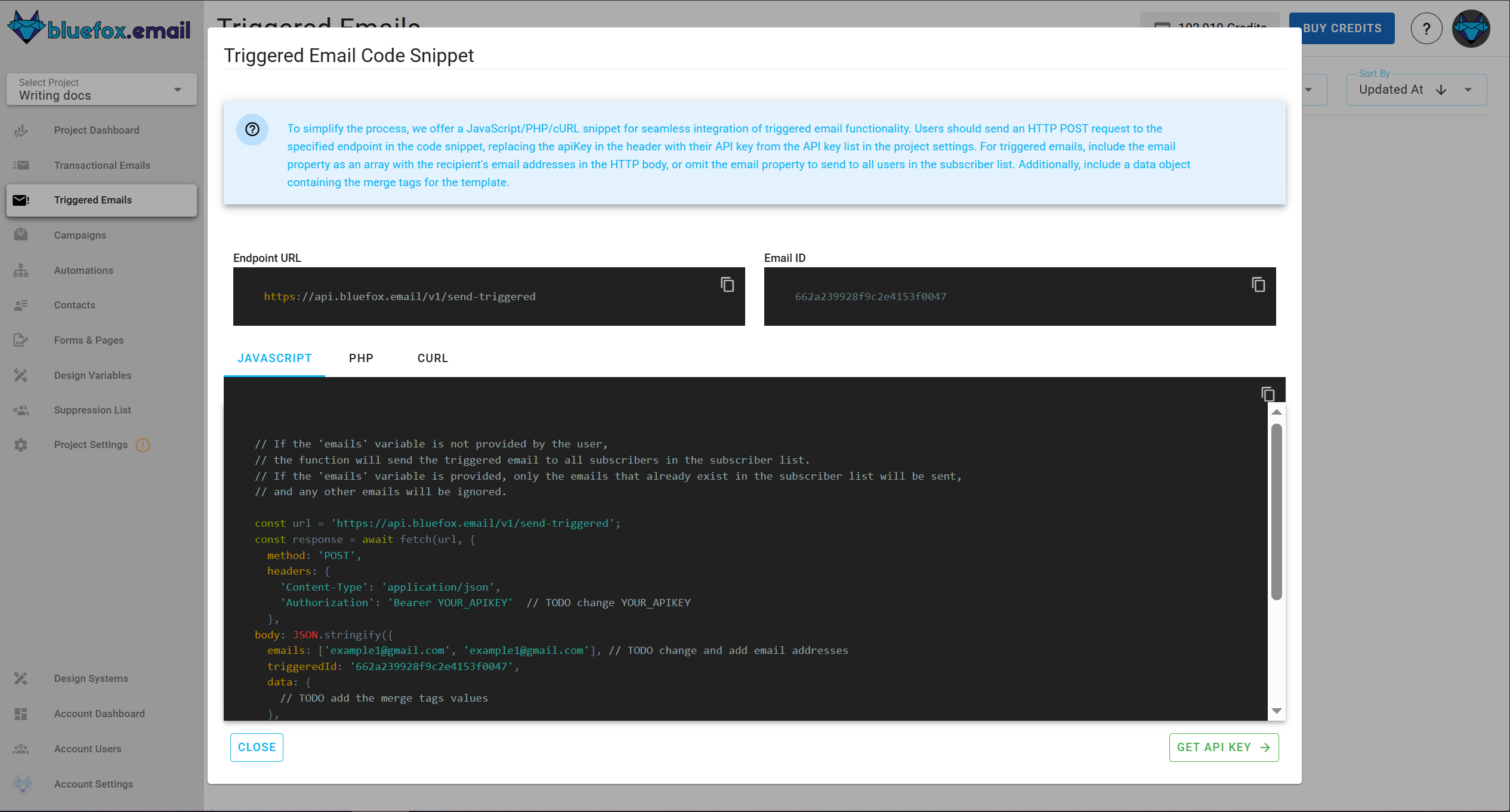Appearance
Send Triggered Email
To send a triggered email, use the following URL pattern:
https://api.bluefox.email/v1/send-triggeredReplace the placeholders with your specific information:
##EMAIL_ID####YOUR_API_KEY##
You can find the required IDs by clicking the Code Guide button on a triggered email card:

In the Code Guide dialog, these values are automatically filled in. If you copy the code snippets, make sure to replace ##YOUR_API_KEY##.

Request Body
json
{
"emails": ["jon@doe.com"],
"triggeredId": "##EMAIL_ID##",
"data": {
"example": "example merge tag value"
// TODO: Add your merge tag values
},
"attachments": [] // optional
}You can include personalization data (merge tags) in the data object. These tags are processed by Handlebars when the email is sent.
cURL Example
bash
curl -X POST \
"https://api.bluefox.email/v1/send-triggered" \
-H "Content-Type: application/json" \
-H "Authorization: Bearer ##YOUR_API_KEY##" \
-d '{
"emails": ["jon@doe.com"], // TODO: Change email addresses
"triggeredId": "##EMAIL_ID##",
"data": {
// TODO: Add merge tag values
}
}'JavaScript Example
javascript
const url = 'https://api.bluefox.email/v1/send-triggered';
const response = await fetch(url, {
method: 'POST',
headers: {
'Content-Type': 'application/json',
'Authorization': 'Bearer ##YOUR_API_KEY##' // TODO: Replace ##YOUR_API_KEY##
},
body: JSON.stringify({
emails: ['jon@doe.com'], // TODO: Change email address
triggeredId: "##EMAIL_ID##",
data: {
// TODO: Add merge tag values
}
})
});PHP Example
php
$apiKey = "##YOUR_API_KEY##";
$url = "https://api.bluefox.email/v1/send-triggered";
$emails = ["jon@doe.com"]; // TODO: Change email addresses
$triggeredId = "##EMAIL_ID##";
$data = [
// TODO: Add merge tag values
];
$payload = json_encode([
"emails" => $emails,
"triggeredId" => $triggeredId,
"data" => $data
]);
$options = [
"http" => [
"header" => [
"Content-Type: application/json",
"Authorization: Bearer $apiKey"
],
"method" => "POST",
"content" => $payload,
],
];
$context = stream_context_create($options);
$result = file_get_contents($url, false, $context);API Responses
| Code | Name | Message | Description | JSON Response Example |
|---|---|---|---|---|
| 200 | - | - | The request was successfully processed. | json { "status": 200 , "result": {"success": true} } |
| 400 | VALIDATION_ERROR | Project Email AWS configurations not found. | Missing AWS configurations in project. | json { "status": 400, "error": {"name": "VALIDATION_ERROR", "message": "Project Email AWS configurations not found."} } |
| 400 | VALIDATION_ERROR | Missing required parameters: triggeredId. | The request is missing mandatory fields for processing. | json { "status": 400, "error": {"name": "VALIDATION_ERROR", "message": "Missing required parameters: triggeredId."} } |
| 400 | VALIDATION_ERROR | Invalid emails format | The request contains improperly formatted emails. Ensure emails is an array of valid addresses. | json { "status": 400, "error": {"name": "VALIDATION_ERROR", "message": "Invalid emails format"} } |
| 405 | METHOD_NOT_ALLOWED | Insufficient credits available. | Occurs when the account lacks the necessary credits to send an email. | json { "status": 405, "error": {"name":"METHOD_NOT_ALLOWED", "message": "Insufficient credits available."} } |